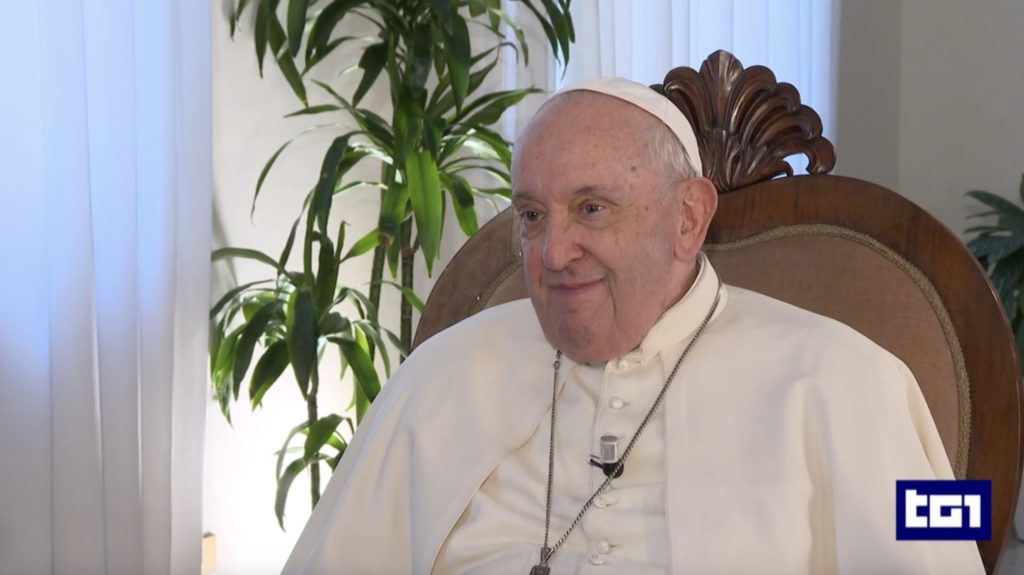In an hourlong interview with Italy's main news program, Pope Francis announced he would travel to Dubai in early December for the U.N. Climate Change Conference, COP28.
He also revealed that he speaks every day with the priest and women religious at Holy Family Church in Gaza, that he was pleased with the assembly of the Synod of Bishops on synodality and that when he insists the church is open to "all, all, all," that includes LGBTQ+ Catholics.
The interview, conducted at the Domus Sanctae Marthae, his residence, aired Nov. 1 on RAI 1 just after the main evening news program. RAI said 4.5 million people watched the broadcast.
Many of the questions and most of the pope's responses were standard for interviews with Pope Francis, who tried to avoid journalists when he was archbishop of Buenos Aires, but who has given dozens of interviews as pope.
The more unusual questions revealed that the last time he spent a day at the beach was in 1975, that he had a girlfriend as a young man and that later, as archbishop, he met her again with her husband and children.
The interviewer, Gian Marco Chiocci, director of the evening news program, also tried to get Pope Francis to pick his favorite soccer player, giving him the choice between two fellow Argentines: the late Diego Maradona or Lionel Messi, who was awarded his eighth Ballon d'Or Oct. 30.
The pope said both were among the best players of all time, adding that Messi is "a real gentleman." But, he said, the greatest is Pelé, the Brazilian star who died in December 2022, and had a big heart as well as being an amazingly talented athlete.
On more serious issues, Pope Francis repeated his conviction that "every war is a defeat," and said he is afraid of the possible expansion of the fighting between Israel and Hamas, although he believes human reason will prevail to prevent that.
Asked about antisemitic acts of vandalism in response to the conflict, Pope Francis said that while antisemitism sometimes is "hidden," or goes underground, it seems to never go away. "I can't explain it, but it's a fact that I see and I don't like."
On the Oct. 4-29 assembly of the Synod of Bishops, the pope said, "The result is positive. Everything was discussed with full freedom, and this is a beautiful thing."
Chiocci noted that members of the assembly spoke about gay Catholics, and he asked if the pope was satisfied with the discussion.
"When I say 'everyone, everyone, everyone,' it's the people. The church receives people, everyone, and does not ask what you are. Then, within the church, everyone grows and matures in their Christian belonging. It's true that today it's a bit fashionable to talk about this. The church receives everyone."
Asked about the role of women in the church, Pope Francis said they should be included in the normal church structures at every level, which is something he has been doing.
But as far as ordination goes, "that is a theological problem, not an administrative problem," he said, not specifying whether he was speaking about ordination to the priesthood or to the diaconate or both.
Pope Francis repeated what he has said in the past: "From a theological, ministerial point of view, there are different things: the Petrine principle, which is that of jurisdiction; and the Marian principle, which is the more important one because the church is female, the church is bride, the church is not male, she is female."
Just as Mary is more important than Peter, he said, "the power of the female church and of women in the church is stronger and more important than that of male ministers."
After the pope said the same thing in an interview with America magazine last year, the Vatican newspaper ran an article by Marinella Perroni, a retired professor of biblical theology at the Pontifical Atheneum of St. Anselm in Rome, who said the idea of a Marian and a Petrine principle was devised in the 1970s to highlight the importance of both men and women in the church.
But, she said, "Doesn't the Marian-Petrine principle express an ideology and rhetoric of sexual and gender differentiation that has now been exposed as one of the covers for patriarchal privileges?"
In addition, she wrote, it stereotypes the differences between men and women and gives them a hierarchical value. The feminine is presented as domestic, interior, welcoming and spiritual, while the masculine is presented as ministerial, authoritative and powerful.
Chiocci also asked Pope Francis if he had ever had a crisis of faith.
"In the sense of losing it, no," he answered. But there have been times when he felt he was walking in darkness and "the Lord was hiding."
Pope Francis said he also has had the experience of asking, "Where are you, Lord? And why don't you fix this?" But then, "you hear the Lord telling you, 'Because I don't have a magic wand.' The Lord is not Mandrake (the Magician), no. He is something else."

